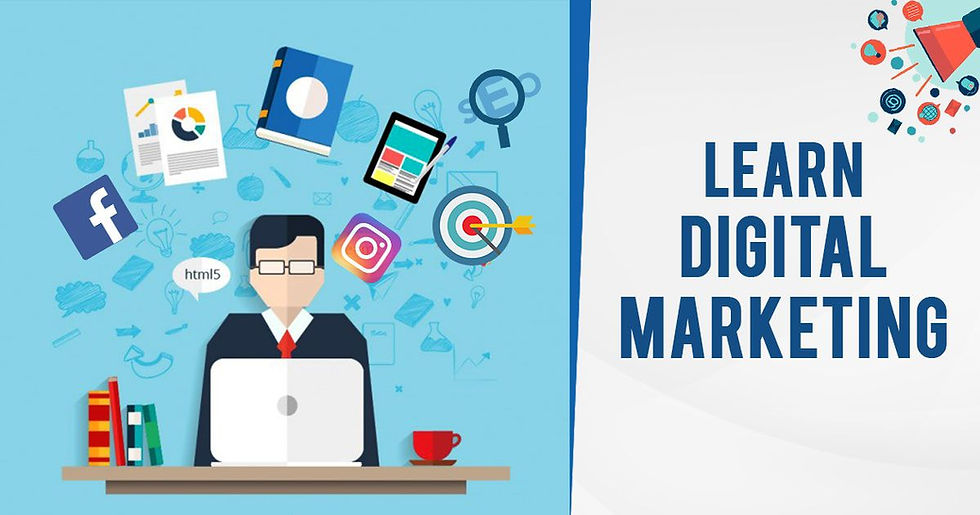How a Digital Marketing Course for Startups Can Help You Grow Faster?
- Penelope Harriet
- Apr 28, 2023
- 3 min read

A strong online presence is critical for any business in today's digital age. This is especially true for startups, which frequently lack the funds to invest in traditional marketing strategies.
Fortunately, digital marketing provides low-cost methods of reaching your target audience and building your brand.
A digital marketing course is a training program that teaches individuals or businesses how to market their products or services effectively online.
Search engine optimization (SEO), pay-per-click (PPC) advertising, social media marketing, email marketing, content marketing, and other topics are covered in the course.
Digital marketing training is designed to provide individuals or businesses with the knowledge and skills needed to develop an effective digital marketing strategy.
This includes knowing how to identify target audiences, create a brand voice and message, create engaging content, and measure marketing campaign success.
Startups can learn how to use these tools to grow faster by enrolling in a digital marketing course or training.
Why Should Take a Digital Marketing Course?
Digital marketing tactics range from search engine optimization (SEO) to social media advertising. While some startups may be familiar with certain aspects of digital marketing, such as social media posting, there is a lot more to learn.
Startups can gain a thorough understanding of the various tools and techniques available by enrolling in a digital marketing course.
Digital marketing courses cover topics such as:
1: SEO
Search engine optimization is the process of increasing the visibility of your website in search engine results pages.
You can increase organic traffic to your website by optimizing it for keywords related to your business.
2: Social Media Marketing
Social media marketing includes advertising your brand and engaging with customers through platforms such as Facebook, Twitter, and Instagram.
3: PPC Advertising
Pay-per-click advertising allows you to publish advertisements on search engine results pages or social media platforms, and you only pay when someone clicks on your ad.
Relevant Resource: Top 7 Benefits of PPC Advertising in Digital Marketing Course
4: Email Marketing
Email marketing involves sending promotional emails to your subscribers, usually with the intention of increasing sales or building brand loyalty.
5: Content Marketing
To attract and retain customers, content marketing entails creating and sharing valuable content, such as blog posts or videos.
Startups can learn how to use these tools effectively and efficiently by enrolling in a digital marketing training.
Startups can create a cohesive strategy that aligns with their goals and budget if they have a solid understanding of digital marketing.
Benefits of Digital Marketing for Startups
Digital marketing offers several benefits for startups, including:
1: Cost-Effective
Digital marketing is frequently less expensive than traditional marketing strategies. Startups can reach their target audience without breaking the bank by targeting specific audiences and using cost-effective tools such as social media.
2: Measurable
Startups can track their results in real-time with digital marketing, making it easy to see what works and what doesn't.
Startups can improve their campaigns by analyzing data such as website traffic and conversion rates.
3: Increased Reach
Startups can reach a global audience through digital marketing regardless of their physical location. This can help them grow their customer base and revenue.
4: Builds Brand Awareness
Startups can raise brand awareness and recognition among their target audience by consistently promoting their brand through digital marketing. This can help to establish their brand as an industry leader.
Relevant Resource: How to Succeed in Digital Marketing Course in Pakistan: Tips and Tricks
5: Improves Customer Engagement
Digital marketing helps startups to interact with their customers in real-time, responding quickly to inquiries and feedback. This can aid in the development of customer trust and loyalty.
Startups can learn how to leverage these benefits by enrolling in a digital marketing course.
Choosing the Right Digital Marketing Course
Startups should consider the following factors when selecting digital marketing training:
Course Content: Look for a course that covers a wide range of digital marketing topics, such as SEO, social media marketing, paid search advertising, email marketing, and content marketing.
Instructor Expertise: Choose a course taught by instructors with real-world digital marketing experience. Look for instructors who have previously worked with startups or small businesses.
Course Format: Consider the course format, whether in-person or online, as well as the course structure. Seek out courses that provide hands-on experience and practical applications.
Course Duration: Consider the course's length and whether it fits into your schedule. Some courses may last several weeks or months, while others may be completed at your own pace.
Course Cost: Compare the prices of various courses and decide whether the investment is worthwhile for your startup.
Startups can select a digital marketing training that meets their specific needs and goals by carefully considering these factors.
Conclusion
Startups can use digital marketing to reach their target audience, build brand awareness, and grow their business at a low cost.
Startups can gain a comprehensive understanding of the various tools and techniques available and learn how to use them effectively by enrolling in a digital marketing course .
Startups can compete with larger businesses and grow faster if they have the right digital marketing strategy in place.



Comments